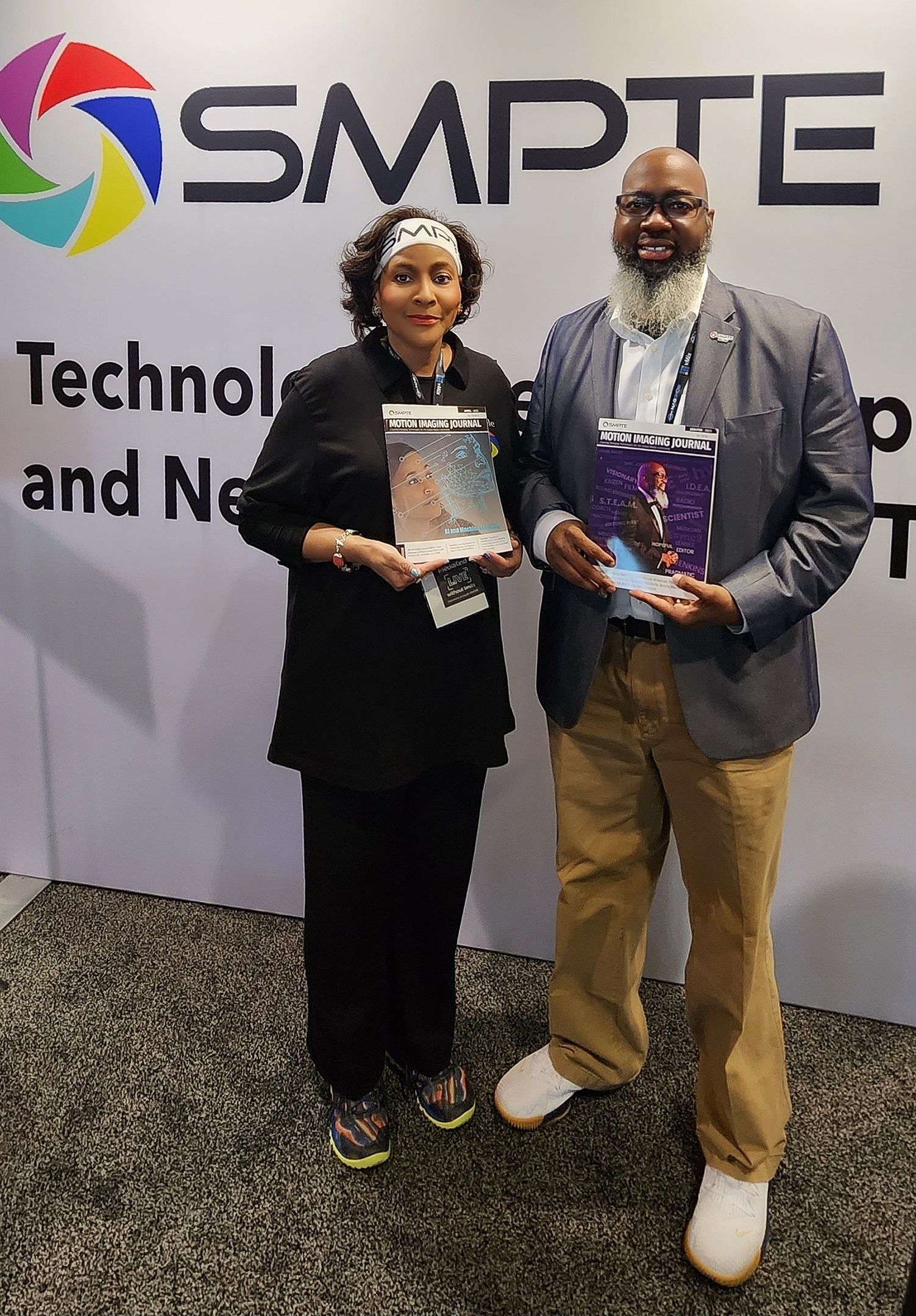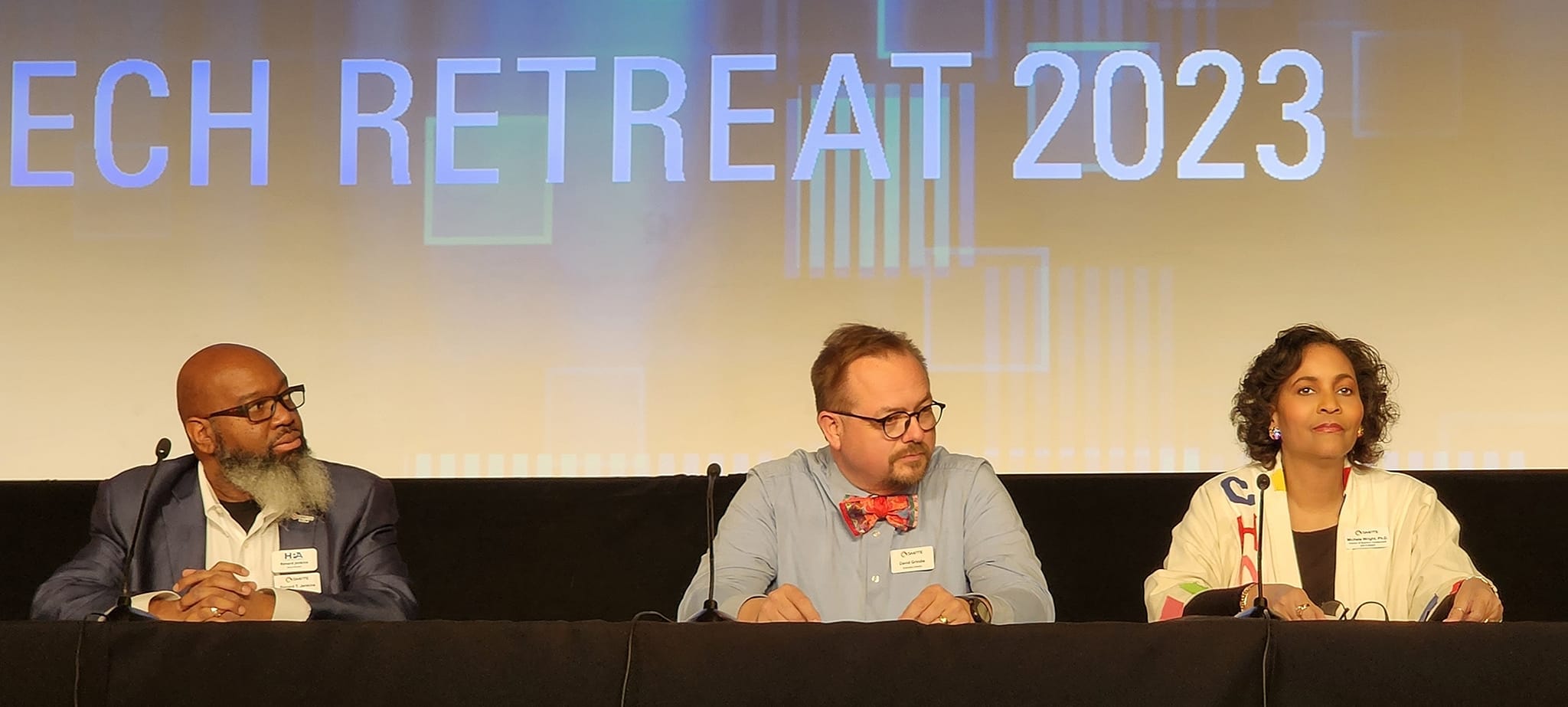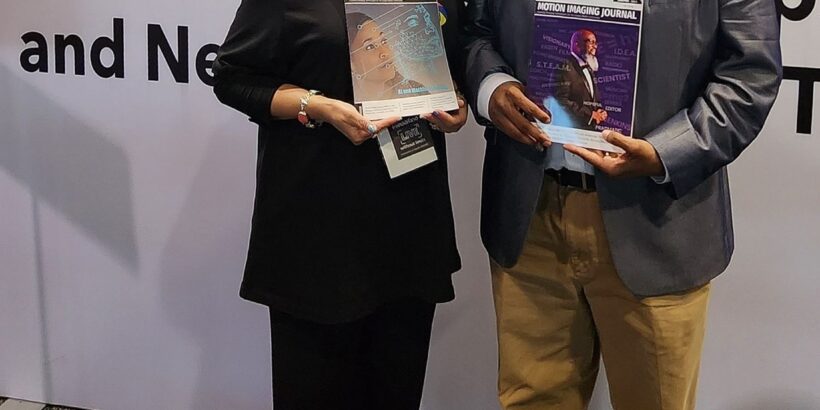
The Society of Motion Picture and Television Engineers (SMPTE) has been the home of media professionals for more than 100 years. Over the past century, the Society has witnessed the rise of the motion picture industry, the introduction of “talkies,” and the emergence and maturation of color TV — in increasing resolutions and dynamic range. SMPTE’s global membership has developed TV’s renowned color bars and the timecode underpinning modern film and TV production, as well as standards facilitating the creation, delivery, and display of movies and shows today.
Along with these vital efforts, the Society recently has undertaken historic DEI (diversity, equity, and inclusion) work that repositions SMPTE to better address the current and future needs of its membership and the global audience of media consumers.
Leading by Example
Among the most notable milestones in SMPTE’s century-long history is the election of Renard T. Jenkins as the Society’s president. Jenkins, who recently completed his tenure as senior vice president of production integration and creative technology services at Warner Bros. Discovery, was elected as the first African American President of SMPTE in January 2023. In this role, in fact, he follows another SMPTE leader expanding the Society’s global inclusivity: Hans Hoffmann, the first SMPTE president from outside North America. Jenkins also earned the distinction of being the first African American on the board of the Hollywood Professional Association, MovieLabs, and the UltraHD Forum.
“I recognize and appreciate the significance of being the first African American across all these governing boards,” says Jenkins, who was featured in — and the first person on the cover of — the SMPTE Motion Imaging Journal. “But if I’m not using that platform to make things better, then it doesn’t matter at all. I want to get to the point where it’s normal to see an executive of Jamaican or African descent in a position of high-ranking authority in the technology sector of this industry — not only being in that position, but actually given the support and the authority to be successful and to effect positive change in that position. Those are the things that really resonate with me. I want that to be my legacy.”
In addition to serving as a leader and role model, Jenkins has led various initiatives designed to build inclusivity in media technology. While at Warner Bros. Discovery, he served as chair of the WBD Technology and Operations Inclusion, Diversity, Equity & Accessibility Council (IDEA) and worked with colleagues to design, establish, facilitate, and support transformative programs including Mentor Forward. At SMPTE he helped to launch the Global Inclusion Working Group, with a focus on connecting with technical organizations, the Hispanic Association of Colleges and Universities, and historically Black colleges and universities (HBCUs).
Through his leadership and his own sense of responsibility, Jenkins has inspired and helped to shape the Society’s extensive DEI work so far in 2023. SMPTE’s vision and efforts in this area took on greater force and focus with the November 1, 2022, appointment of Dr. Michele Wright as SMPTE’s new director of business development and outreach. Known as a change-maker, Wright is charged with fostering further growth for the Society and with leading meaningful change with respect to DEI. She followed in Jenkins’ footsteps by becoming the second person and first woman to grace the cover of the SMPTE Motion Imaging Journal in April 2023.
“It is an honor to guide SMPTE’s business development, outreach, and DEI efforts in my leadership role, and I value and embrace the opportunity to complement and augment the achievements of Renard Jenkins in doing this work,” says Wright. “I deeply appreciate the remarkable commitment of Renard and my SMPTE cohorts to the Society in general and to DEI in particular. I am extremely passionate about DEI and the synergistic array of advantages, strengths, and possibilities it brings to the table. But it takes all three working wholistically to ensure individual and collective success — because diversity may bring people to the table, but inclusion ensures that everyone at the table is welcome to partake in what’s being prepared. Equity gives everyone being served the utensils they need to receive their due portion.”
Wright began her professional career as an engineer, with degrees in both electrical and industrial engineering, and evolved into a multidimensional senior executive with experience in pharmaceutical/biotechnology sales, healthcare administration, and business development for Fortune 100 companies and an international non-profit organization. As the first The National GEM (GEM) Fellow at the University of Tennessee Space Institute (UTSI), she organized and chartered the university’s first National Society of Black Engineers (NSBE) chapter, which received NSBE’s Regional Chapter of Scholars Award, and was named a NSBE Fellow during her two terms as president. Over her subsequent career, Wright earned numerous accolades and awards for her work as an advocate for health equity, as an author and creator of social-emotional and STEM-focused content and edutainment platforms for elementary students, and as a business and organizational leader.
As SMPTE Executive Director David Grindle noted in welcoming Wright to the Society: “Michele comes to this SMPTE role ready to partner with colleagues in realizing meaningful change and growth for the Society. She has a unique ability to share and communicate a vision for change, and then to foster and guide a practical approach to implementation and administration.”
In the days and months since Wright joined the SMPTE team, she and her colleagues have pursued the vision of meaningful change with purpose and vigor, delivering real results and building a framework for even greater achievements in the coming year.

Delivering Real Results
Jenkins and Wright wasted no time in spreading the word about DEI efforts on behalf of SMPTE and the larger media technology industry. In February at the Hollywood Professional Association’s (HPA) annual tech retreat, they joined Grindle and SMPTE Past President Hoffmann to present “SMPTE for a Change,” detailing how new leadership in the organization is working toward innovations in technology, as well as increasing DEI in the industry through real change.
The ongoing SMPTE for a Change campaign reflects the Society’s evolution along with the fields of film and television, and it is designed to support and inspire SMPTE and its membership as they strive for greater diversity, equity, and inclusion across the industries.
SMPTE next extended its DEI efforts to students with a special emphasis on HBCUs. On March 27, SMPTE leadership including Jenkins, Grindle, and Wright joined Zandra Clarke, who serves as both SMPTE Membership Director and Transmission Specialist III at Warner Bros. Discovery, for a meeting with students and faculty of the Atlanta University Center (AUC).
To delve into ways the Society can work with HBCUs to help bridge the DEI gap in the film and media industry, the SMPTE team sat down for a discussion with Eve Graves, chairperson of the Theatre and Communication Studies Department at Clark Atlanta University (CAU); April Lundy, chairperson of the Mass Media Arts Department at CAU; Brian Bentley, associate dean of the School of Arts and Sciences at CAU; Roy George, chairperson of the Cyber Physical Systems Dept at CAU; and Keith Arthur Bolden, associate professor of the Department of Theatre and Performance at Spelman College.
“This was a novel meeting in SMPTE’s history, but it won’t be the last of its kind,” says Wright. “We look forward to more synergistic collaborations with HBCUs all over the nation.”
Students are the future of SMPTE, and the Society is focused on paving a path for them. To this end, development of partnerships with HBCUs are part of the new SMPTE for a Change campaign, which not only focuses on student outreach and DEI but also seeks to diversify the industry to make it more accessible and equitable. The campaign incorporates mentorship programs, grants, access to webinars and online classes, and an improved job board.
In working with HBCUs, SMPTE is also collaborating with the AUC, comprising Clark Atlanta University, Spelman College, and Morehouse College, to discuss the creation of curriculum, internships, mentorships, and scholarships to create a foundation for future industry leaders.
Moving the Needle More Broadly
While working with SMPTE colleagues to launch SMPTE for a Change and to build relationships with HBCUs and other institutions to foster greater engagement, Jenkins and Wright continued their work to support STEM outside SMPTE.
Jenkins led the founding of SMPTE’s committee on DEI, serving as its first chair, and extended that leadership by joining fellow HPA board member and HPA DEI committee co-chair Kari Grubin to bring together industry professionals who want to move media and entertainment (M&E) toward being an inclusive and equitable place for all people. Grubin and Jenkins’ first initiative, HPA ALL, highlights career pathways and creates opportunities for contributions by and visibility for underrepresented groups to strengthen the media and entertainment community.
“I want to get to the point where there are no firsts — where people are given the opportunity to grow and succeed and get the opportunities everyone else gets,” says Jenkins. “I truly want to see this industry be as inclusive, equitable as it can be.”
Beyond involvement in the professional realm and through SMPTE, Jenkins is dedicated to DEI work across a variety of organizations close to his heart. He serves on the advisory board of Exceptional Minds, an academy and studio preparing young adults on the autism spectrum for careers in animation, visual effects, 3D gaming, and other related fields in the entertainment industry. The organization provides technical and work readiness training customized to help students achieve their full artistic and professional potential.
Jenkins also supports STEAM:CODERS, an organization that inspires underrepresented and underserved students and their families through science, technology, engineering, art, and math (STEAM) in preparation for academic and career opportunities. Teaching logic, critical thinking, and problem solving, STEAM:CODERS aims to introduce 1,000,000 students to the fundamentals of STEAM by 2045.
“As a man of color in the STEAM field and as a father of two daughters who wants to help create a world where their options are not limited, I’m an avid supporter of both STEAM:CODERS and Girls Who Code,” adds Jenkins.
Girls Who Code is an international nonprofit organization that aims to support and increase the number of women in computer science. In hosting summer immersion programs, a specialized campus program, after-school clubs, a college club, and a series of books, the organization maintains as part of its mission a focus on diversity, equity, and inclusion.
Wright likewise has been committed to STEM/STEAM with a focus on DEI over her career, in and beyond her professional roles. She recently presented a seminar session on STEM/STEAM Edutainment in June at the Hot Springs Technology Institute (HSTI) Conference in Hot Springs, Arkansas. Celebrating its 30th anniversary, the event featured keynote speaker Mae Jemison, the renowned American engineer, physician, and former NASA astronaut who became the first African American woman to travel into space when she served as a mission specialist aboard the Space Shuttle Endeavour in 1992.
Also considered among the most influential black engineers in history, Jemison is among the 85 remarkable diverse trailblazers in film, music, medicine, education, and business included in Wright’s 2009 book titled, “DEAR SUCCESS SEEKER: Wisdom from Outstanding Women.” Published by Simon and Schuster, this book received the USA “Best Books 2011” Top Award for new best non-fiction and was just recently added by Supervisory Museum Curator Janice Hodson to the reference shelves of the John F. Kennedy Presidential Library and Museum.
In her role as the president and board chair of the Milton Pitts Crenchaw Aviation Training Academy (MPCATA), a non-profit organization founded in 2009 in honor of the late Tuskegee Airman Milton Pitts Crenchaw, Wright (a native of Tuskegee, Alabama) attended the United States Air Force auxiliary, Civil Air Patrol, ceremony recognizing approval of a new squadron named in Crenchaw’s honor. The Crenchaw Memorial Squadron is also the Civil Air Patrol’s first school-based squadron in Arkansas. Hosted at Little Rock School District’s Cloverdale Middle School, the event honored MPCATA for its continued support and partnership with Cloverdale over the past 13 years.
Wright has also been invited to speak at the Freedom to Grow Conference in Atlanta this coming October. In addition to presenting on “The Need for Film in Agriculture,” Wright will be the recipient of the inaugural 2023 Freedom to Grow Agriculture, Climate, and Environment (ACE) Award for her work in DEI. The award recognizes her outstanding career, philanthropic efforts, community service, and commitment to society. Additionally, she received the 2023 Outstanding Achievement Award at the 13th Annual World Music & Independent Film Festival (WMIFF) and was nominated for Global Genes’ 2023 RARE Champions of Hope award for raising the bar through her DEI work and innovative approaches to research, programming, and advocacy to create meaningful impact in the rare disease community.

Engineering the Power of Color Symposium
Jenkins, Wright, and Grindle have been working with Clarke to organize The Power of Color Symposium at Warner Bros. Discovery headquarters in Atlanta. The first-of-its-kind national event will be hosted by SMPTE during the start of Black History Month, February 6-7, 2024, with a focus on DEI. It will explore the art, science, and engineering related to various aspects of color in the film, television, animation, and gaming industries, including considerations such as diverse hues, eye color, and human features.
“The industry has made progress in leaps and bounds, particularly in recent years with movies like ‘Black Panther’ and others, but we have work to do in terms of diversity, equity, and inclusion; we still need to have constructive dialog about how to do better in portraying diverse characters and their stories,” said Clarke, whose own firsts include being the first woman of color to serve as chair for the SMPTE Atlanta Section and the first woman of color to serve as SMPTE membership director.
Clarke continues, “The symposium gives us the opportunity to share the techniques used successfully by talented artists across the globe to convince audiences to embrace characters and their stories. People working in the field can ‘skill up’ and scale up their toolkit by learning about lighting, makeup, and other elements that are critical while working with all the beautiful hues that make up humanity. At the same time, students and young professionals attending the symposium can discover that there is a career path for them in this dynamic industry and a home for them within SMPTE.”
The symposium will bring together current and emerging leaders from an array of art, science, and technology backgrounds to discuss advancements in designing, capturing, and delivering the world’s full breadth and depth of tone, texture, and vibrancy. Through in-person and online panel discussions, sessions, and workshops, SMPTE will amplify the voices and insights of industry leaders committed to exploring and expanding topics, conversations, and techniques that advance the power of effective color representation throughout the media and entertainment industry.
Looking Ahead to Further Change
Technology never stops changing, and neither does SMPTE. While the Society has served the industry for more than 100 years, it is focused on addressing the needs of a changing industry. And as SMPTE continues to forge new paths in serving as the global face and home of media professionals, technologists, and engineers into the next 100 years, it is fully committed to making room for new voices, younger and more diverse members, working together to drive the industry forward.
“The game-changing knowledge and forward-thinking tools that SMPTE has brought to the art, business, science, and technology of the moving image over the past century have been unparalleled,” declares Wright. “A global leader, the organization set the bar — not just for color — and then raised it to insurmountable heights across the film and television industry. As we move forward into the coming decades and centuries, real change with respect to diversity, equity, and inclusion across SMPTE will augment the relevance and utility of the Society, contributing to its longstanding impact for humanity. The best is yet to come!”
